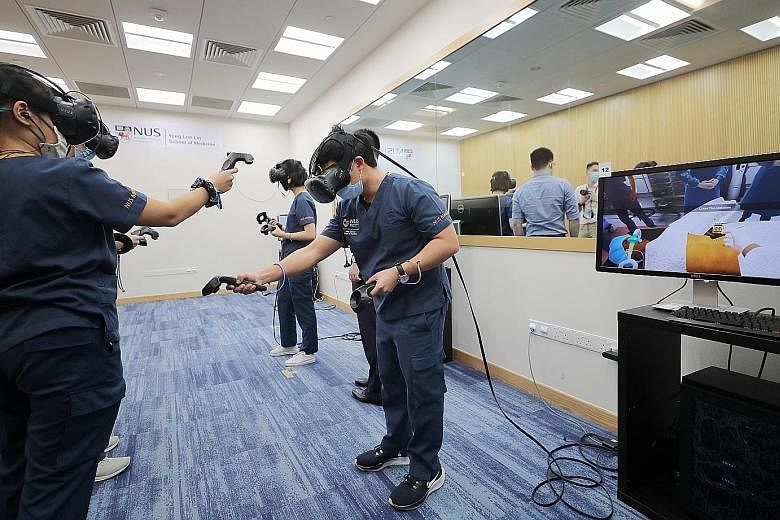All medical students at the National University of Singapore (NUS) will be taught patient safety through a virtual reality (VR) game, a move prompted by the Covid-19 social distancing rules.
The game, called PAtient Safety aS Inter-Professional Training (PASS-IT), will use VR to get all 1,500 of them acquainted with the proper procedures in operating theatres.
It was developed by the NUS Yong Loo Lin School of Medicine (NUS Medicine). The school has 12 such VR stations. Each has a 15-minute game with various medical scenarios that will require the students to "act out" the standard operating procedures.
These range from how to check for a patient's consent and verify their identity, as well as the correct ways to handle surgical tools and what must be done if a team member accidentally cuts himself.
NUS Medicine said yesterday that such skills have traditionally been taught in clinical settings, in which medical students are brought to a patient's bedside to observe how doctors work.
But with the Covid-19 situation, "students have been removed from these settings of practical learning due to the risk of exposing them to aerosol-generating procedures", it added in its statement.
Associate Professor Alfred Kow, assistant dean of education of NUS Medicine, said: "This VR system is a good tool to help the students consolidate their learning despite increased clinical restrictions."
In PASS-IT, students don VR headsets and wield hand-held controllers as their movements are observed by educators who guide them.
Their physical movements and actions are tracked and displayed in real time on a screen, allowing their teachers to see and evaluate them.
They also have to attend an hour-long lesson before the game, as well as a short debrief session after.
PASS-IT was developed late last year and has been in trial for the past two months.
Depending on their area of specialisation, students will go through the game in the third, fourth or fifth year.
NUS Medicine said students who have completed the game showed improved understanding of the steps that have to be taken in an operating theatre.
Undergraduate Eleanor Loh, 20, said that while it was not the first time she and her coursemates had been told of the procedures featured in PASS-IT, it was the first time they had to physically act them out.
Even though it was a virtual experience, Miss Loh, a third-year student, said it was better than sitting through a lecture or conventional lesson.
"Playing the game gave me a good understanding of the flow of these procedures and how they work. And from acting out these procedures, they tend to stick," she said.


